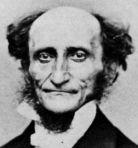This continues from
Part 1 in a short 4-part series on the subject of
liturgy and
vestments. This post is especially on
vestments for ministers of the Word and Sacrament, a subject that can be quite confusing for me. The LC-MS congregation that I grew up in had two different pastors before my father retired and moved off the farm to town. The earlier pastor had a black robe during services, the later one used a white robe. When one researches the subject of vestments, one is met with a profusion of vestment pieces for Roman Catholic church officials –
Choir Dress,
Surplice,
Cassock,
Cope,
Chasuble,
Alb,
Geneva Gowns and
Bands, etc. I am not sure of exactly what were the customary vestments among the Old German Missourians, but they were working towards returning to the practices of the early Reformation. The
photo of Pastor Sieker in NYC showed a "Geneva Gown" with "
Geneva Bands". Most other images of early Missourian vestments are like this:
here,
here, and
here. Luther wore black robes in most paintings of him.
In Walther's
Der Lutheraner, matters of liturgy were covered, but vestments as such were
not taken up in any major essay. However he did make the following brief comment in a blurb about the Reformed practice of avoiding gowns or robes for pastors (
Der Lutheraner vol. 27 (Dec. 15, 1870), p 61 [
EN]:
- - - - - - - - - - - - - - - - - - - - - - - - - - - - -
Chancel robe [Chorrock]. Until now, the Reformed in America have declared it to be a papal leaven that the preachers in the Lutheran church wear a so-called chancel robe [Chorrock] or priest's robe [Priesterrock] in the service. As in many such matters, the Reformed now seem to have come to a better conclusion, and to realize that a suitable dress for the preacher in the church, where everything is to be done properly and honestly, is a good thing (1 Cor. 14:40). The Reformed Evangelist at least reports that in New York several Presbyterian preachers, at the request of the congregation, are now preaching in Geneva gowns, claiming that this is the traditional dress of Presbyterian preachers. — W. [Walther]
- - - - - - - - - - - - - - - - - - - - - - - - - - - - -
This blurb is the only direct comment by Walther that I could find in his
Der Lutheraner, the publication to the widest audience in the Old Missouri Synod, on vestments. (There is one on
chanting in 1853
here and
Logia 8-1 p. 53) It demonstrates two things: (1) Walther defended the historic Lutheran practices against the Reformed, and (2) Walther did not build the Lutheran Church in America by
focusing on
Liturgy and
Vestments, but by
teaching, i.e.
doctrine, pure Lutheran doctrine, contained in the Bible and the Lutheran Confessions. These he would defend to the death.
Unlike Walther and the Old German Missouri Synod, today's LC-MS is focused on both, especially Liturgy/Vestments. Their doctrine is distinctly Romanizing, while hypocritically maintaining otherwise. And so their focus on Liturgy and Vestments, while ostensibly defending against America's Puritanism and Reformed sectarianism, is actually departing from Lutheranism.
The practice of Lutheran vestments was not Walther's main focus in his teaching,
except when the Reformed taught against it. In other words,
doctrine ruled liturgy and vestments, not the other way around. Walther followed Luther in this matter. Liturgy and vestments were not Luther's focus in initiating the Reformation, it was Doctrine. The Old Missouri master liturgist Pastor Friedrich Lochner, in his magisterial book
Der Hauptgottesdienst, p.
19 (English
CPH 2020, p. 17), quoted Luther on this subject, who said [
AE 53:31], (Lochner's emphasis):
“We have not said anything about vestments, but we think of them as we do of other similar external gestures. We leave them to be used freely, provided pomp and other excess be avoided.”
The leader of the LCMS band of pastors "
Gottesdienst" certainly could be questioned about his "pomp and other excess", not so much because of his vestments, but because of his
Romanizing doctrine. This is confirmed in his online library "
Gottesbibliothek" where they unapologetically promote Roman
Catholic Liturgics, and
well-known Catholic liturgists. I confess that I find some members of "Gottesdienst" to be sincerely devoted to Lutheran liturgics, yet they should not be in league with clearly
Romanizing pastors and leaders. The LCMS can cry "Vatican II!" all they want, but Vatican II did
not overturn the chief articles of the Council of Trent on
sola fide. All the fine LCMS liturgics and vestments without the right Doctrine of Justification are… nothing. (More on the "Gottesdienst" group in
Part 4 of this short series.)
"Not the great number of her adherents, not her organizations, not her charitable and other institutions, not her beautiful customs and liturgical forms, etc., but the precious truths confessed by her symbols in perfect agreement with the Holy Scriptures constitute the true beauty and rich treasures of our Church, as well as the never-failing source of her vitality and power."
In the next Part 3, we offer an English translation of Paul E. Kretzmann's collection of Martin Luther quotes on these matters, almost half of which have never before been published in the English language. All Lutherans should learn from Luther on matters of Liturgy and Vestments.





No comments:
Post a Comment
Comments only accepted when directly related to the post.